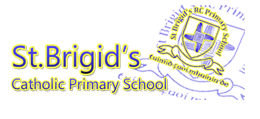Religious Education at St Brigid’s Catholic Primary School follows the Archdiocese of Liverpool programme “Come and See”. Each class covers 3 topics each term which link to a whole school theme. The information and documents below provide more detailed information.
- Come & See Overview
- Come and See Big Questions
- Come and See Programme Delivery
- RE Planning Grid 24-25
Religious Education is the core subject in our curriculum; it influences all that we teach and enables us to develop the child as a whole person.
Through religious education teaching and learning we aim to:
- Provide each child with the opportunity to develop their relationship with God.
- Promote knowledge and understanding of Catholic faith and life.
- Develop awareness and understanding of the impact of faith upon our daily lives.
- Foster attitudes of respect towards all who live in our society.
- Develop skills linked to the reflection upon and practice of religious belief.
The ‘Come and See’ curriculum offers the opportunity to search, to explore, to discover, and to respond. The ‘Come and See’ document supports the central belief of Christ being at the centre of all that we do.
In each of the terms it addresses 3 key questions to be explored through the teaching and learning in the different topics:
Where do I come from? (autumn)
Who am I? (spring)
Why am I here? (summer)
Across the academic year, our children will study 9 themes/topics. The themes are explored over a 4 week period, with time dedicated to exploring the basis of the theme, revealing the meaning of scripture and the Church’s teaching and reflecting on the child’s learning and experiences. During the year we also explore other faiths; Judaism is included every year and the other religions covered over a 3 year cycle are Islam, Hinduism and Sikhism.
There are three different types of themes within the programme, which are covered once per term. They are:
- Church themes
- Sacramental themes
- Christian Living themes
Each theme is explored through a different topic in each age group.
AUTUMN
The three autumn time themes are developed in the light of an understanding of Creation:
Family Domestic Church focuses on life as gift, myself as a unique and loved creation, the love and care that can be expressed in family groups.
Belonging Baptism/Confirmation focuses on the call to belong, the creative potential that belonging develops; and Baptism and Confirmation, sacraments of the gift of God’s life and friendship.
Loving Advent/Christmas focuses on the capacity for entering into loving relationships and the perfect gift and revelation of God’s love, Jesus, born of Mary, born as one of us.
SPRING
The three spring time themes are developed in the light of an understanding of Incarnation:
Community Local Church focuses on the people of God gathered in Christ, united in the journey of faith, in care for one another, in sharing their story and in celebration.
Relating Eucharist focuses on the invitation to know Jesus, to live in communion with him and with one another.
Giving Lent/Easter focuses on Jesus’ loving self-giving on the cross, the Father’s love that raises him to new life and the challenge to Christians to follow Jesus’ example of self-giving.
SUMMER
The three summer themes are developed in the light of an understanding of Redemption and the work of the Holy Spirit:
Serving Pentecost focuses on the on-going mission of Jesus Christ in the Church through the power of the Holy Spirit.
Inter-relating Reconciliation focuses on the love, compassion and forgiveness of God the Father revealed in Jesus and poured out by the Spirit to bring forgiveness and reconciliation in the sacrament of Reconciliation.
World Universal Church focuses on the same love revealed in the diversity of the world and its people, and in the gifts of the Spirit that bear fruit in love, joy, justice and peace for all people. Each theme is explored in the different year groups as a different named topic.
Assessment against the Skill Words
|
Skill Words |
||
|
AT1- learning about |
AT2- learning from |
|
|
EYFS |
Recognise |
Talk about |
|
Labelling, Naming, Sorting, Matching |
||
|
Y1/2/3/4 |
Describe |
Ask |
|
Retelling, Discussing, Sequencing, Identifying, Recalling |
||
|
Y3/4/5/6 |
Give reasons |
Make links |
|
Answering Questions, Making Links and Connections, Describing, Reflecting, Investigating |
||
|
Y5/6 |
Show understanding |
Engage and respond |
|
Comparing, Responding, Applying Ideas, Interpreting |
||

